Party politics is not what it once used to be. The major parties used to contain millions of members; today, they are small organisations composed of a few dedicated activists. At the latest count Labour had around 190,000 members, the Conservatives around 150,000 and the Liberal Democrats just 44,000.
In a society that has become ever more individualised and where people’s social lives are no longer rooted in their local working men’s clubs or liberal associations, that decline is unsurprising. But it has nonetheless had major consequences for political campaigning, and particularly for the Liberal Democrats.
Hard graft
In the past, the Liberal Democrat party has cultivated its success on the back of localised, grassroots campaigning. The party has a reputation as a hard worker: its councillors run intensive local campaigns, its activists are highly visible in their local communities, and the party just gets things done.
This work ethic has been critical for much of the party’s success, and has allowed the Liberal Democrats to build strongholds in constituencies such as Eastleigh.
In his spring conference speech, Nick Clegg argued that it was this activism that would mean that at the General Election the Liberal Democrats would “defy the odds and win again this May” and “do so much better than anyone thinks”. As he put it:
In those seats where we are out in force, making our case loudly and proudly, we are the ones making the weather. I’ve seen it for myself in Liberal Democrat seats across the country. We are showing that with hard work, strong local campaign teams and a record of delivering for people in national and local government, we can and will win.
We have demonstrated it in countless council elections. We have demonstrated it in mayoral elections in Bedford and Watford. And we demonstrated it in Eastleigh in the only parliamentary by-election that was held on our turf.
It won’t be easy, but winning shouldn’t be. We need to persuade people every day between now and May the seventh that their lives will be better with Liberal Democrat councillors making a difference in their communities, Liberal Democrat MPs fighting their corner in Westminster and Liberal Democrat ministers serving them in government. Every Liberal Democrat elected in May makes our voice louder.

This reputation is well deserved, but it depends on active local parties and enthusiastic Liberal Democrat councillors who do the hard work for the party on the ground. And that foundation is crumbling.
Falling away
Since May 2010, Liberal Democrat party membership has fallen by more than 20,000, from 65,038 in 2010 to the current 44,000. Similarly, the number of Liberal Democrat councillors has declined from 3,944 councillors in 2010 to 2,282 in 2014; meaning that whilst the party used to control 25 councils, they now control just 10.
This means the party not only has less power in local communities, but also has fewer people prepared to, as Clegg says, “get out there and tell people what we have done to help them and their community”.
This is a real problem for the Liberal Democrats – because, as Clegg acknowledged, “No one else will do it for us”.
With the party already at a financial disadvantage compared to Labour and the Conservatives, the Liberal Democrats are likely to face real difficulties in getting their message across to voters – especially when attention is paid to the two main parties and emerging forces such as UKIP and the Greens.
Whilst Clegg may therefore be hopeful of confounding expectations in May it appears that the legacy of a falling membership and the decline in the number of Liberal Democrat councillors will be real barriers to realising this aim.

